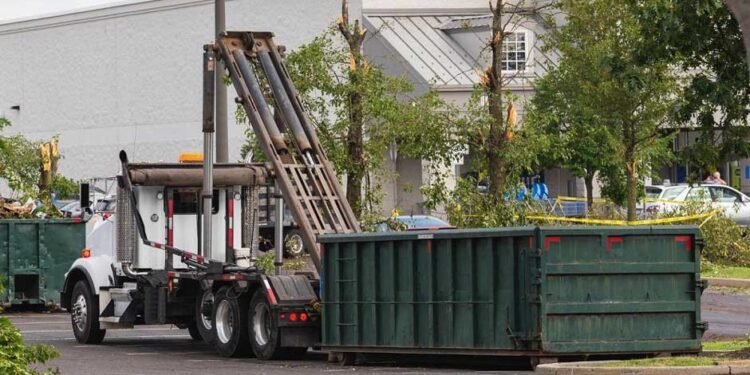Introduction to Roll-Off Dumpsters
Roll-off dumpsters are revolutionizing waste management approaches across various sectors with their robust design and versatility. Their large, open-topped structure makes them particularly valuable for projects demanding large-scale clean-ups, such as construction demolitions, major home renovations, and significant landscaping projects. Handling different types of waste—household clutter, construction debris, or organic materials—without frequent disposal trips offers monumental convenience. For those in Tarboro dumpster rental provides a tailored local service to meet these comprehensive waste management requirements.
The transformation in managing waste can largely be attributed to these dumpsters’ operational efficiency. They allow projects to maintain productivity without the constant worry of waste accumulation. By streamlining the disposal process, roll-off dumpsters play a pivotal role in maintaining sanitary and organized work environments, thus promoting safety and effectiveness in project execution.
Choosing the Right Size
Determining the appropriate dumpster size is a crucial step that can significantly influence the logistics and cost-effectiveness of your waste management strategy. With sizes typically ranging from 20 to 40 yards, matching the dumpster to the project’s specific needs is essential. A 20-yard Rocky Mount dumpster rental is often adequate for small cleanouts or modest renovation projects, offering sufficient space to handle typical household waste or minor construction debris without occupying excessive space on site. Conversely, large-scale projects such as commercial construction or significant home additions may necessitate a 30-yard or even a 40-yard dumpster to efficiently accommodate high volumes of waste. Opting for the correct size can also prevent the cost implications of renting additional containers or handling excess capacity, further contributing to project efficiency.
Uses of Roll-Off Dumpsters
Roll-off dumpster applications extend beyond conventional construction sites. They find purpose in community clean-up events, sizable DIY home projects, and disaster recovery efforts. Their capacity to manage varied waste types, from yard waste to heavy concrete, underscores their versatility and makes them indispensable across multiple domains. According to recent industry insights, roll-off dumpsters are increasingly utilized innovatively, including temporary storage units at event sites or large agricultural clean-ups, further evidencing their adaptability.
These dumpsters are excellent tools for efficient waste segregation and disposal. They help streamline operations and ensure that waste management does not become a bottleneck during large-scale initiatives or community improvement campaigns.
Environmental Impact and Sustainability
Roll-off dumpsters are crucial in promoting sustainable waste management practices in an era of imperative environmental accountability. By facilitating the efficient segregation and recycling of materials, these dumpsters minimize the ecological impact of waste disposal. This efficient categorization of waste reduces landfill reliance and promotes the recycling of materials, thus conserving natural resources.
Partnering with responsible dumpster rental services that prioritize recycling and adhere to local environmental regulations amplifies these benefits, ensuring that waste is managed in a manner that is friendly to the ecosystem. Such practices help communities and businesses uphold sustainability commitments, aligning with broader global environmental goals.
How to Rent a Roll-Off Dumpster
Advancements in digital tools and online booking systems have simplified renting a roll-off dumpster. This ease of access allows users to select the appropriate dumpster size quickly, set rental durations, and arrange delivery from their digital devices. Many companies also offer flexible rental periods and responsive pick-up and delivery services, allowing customers to adjust their plans as project needs evolve.
Accurate estimation and planning during the booking process are vital in optimizing the rental experience. This ensures that the dumpster is available when needed without unnecessary costs. This foresight helps maintain workflow continuity, preventing disruptions often caused by waste overflow or inadequate disposal solutions.
Cost Considerations
Cost is a fundamental factor in selecting a dumpster rental service. Several elements contribute to the overall cost, including the dumpster size, the type of waste, and the rental duration. While comparing prices, it is essential to take a comprehensive view of potential additional charges that may arise from factors such as exceeding weight limits or extending the rental period.
By obtaining quotes from several providers and evaluating their service offerings, the likelihood of finding a cost-effective and suitable solution that aligns with budget constraints and project requirements increases. Transparent cost assessments foster informed decisions, balancing budget considerations with service quality and reliability.
Safety Tips for Handling Dumpsters
Safety is paramount when dealing with roll-off dumpsters to prevent accidents and promote efficient waste management. Correctly placing dumpsters on stable ground, away from power lines and pedestrian paths, minimizes risks during operation. Overfilling dumpsters should be avoided to prevent spillage and ensure safe transport.
Adherence to guidelines concerning the disposal of hazardous materials is crucial, as improper disposal can lead to safety hazards and environmental damage. Informed usage of roll-off dumpsters ensures a seamless project flow, safeguarding individuals’ well-being and the integrity of the environment.
Final Thoughts
Roll-off dumpsters are valuable in executing efficient and environmentally friendly waste management. Individuals and organizations can maximize their utility by understanding the nuances of their operation, from choosing the right size to adopting sustainable practices. Integrating these practices into waste management plans supports the efficiency of ongoing projects and the broader goal of fostering sustainable and harmonious interactions with our environment.












